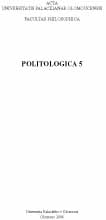Václav Perek und der tschechisch-deutsche Ausgleich in Mähren aus dem Jahre 1905
Vaclav Perek and the equilibration between Czechs and Germans in Moravia (1905)
Author(s): Pavel MarekSubject(s): Politics / Political Sciences
Published by: Univerzita Palackého v Olomouci
Keywords: politics; Václav Perek; Czech-German reconciliation in Moravia; education; Young-Czech Party in Moravia; Prostějov
Summary/Abstract: The essay brings forward a concise biography of JUDr. Václava Perek (b. 27 Sept 1859 in Kamenice nad Lipou, d. 19 May 1940 in Prague), a prominent figure of the Czech pro-national politics as it evolved in Moravia at the turn of the 20th century, scrutinizing his involvement in preparing and arranging the so-called ‘Moravian Accord’ of 1905 that facilitated reconciliation between Moravian Czechs and Germans. (Perek drafted a so-called Lex Perek then – an act regulating admission of pupils to “national”, i. e. primary, schools.) A graduate from the Prague Law School, V. Perek had gone through several firms of solicitors in Prachatice, Prague, and Kyjov, before establishing a firm of his own in Moravský Krumlov (1890) and later in Prostějov (1900) and Prague (1920). In 1890s he joined the Czech national emancipation movement as an economic expert, well-versed in the agricultural issue and needs of the peasantry. Having split with the Old-Czech Party early in the 1890s, he sided with Stránský’s People’s Party of Moravia, a pro-Young-Czech movement, and belonged to its leaders until the World War I, representing the Party in the Moravian Land Diet (provincial assembly) from 1898 to 1905. Between 1898 and 1905, V. Perek took part in negotiations between Moravian Czechs and Germans that resulted in the ‘Moravian Accord’ and adoption of the socalled ‘Perek’s Education Act’. However, the elections of 1906 marred his further political ambitions, as Perek lost his seat in the Land Diet due to his aggressive rhetoric targeted against the Progressive Movement, National Social Movement, Social Democracy, and political Catholicism. Subsequently, he withdrew to the municipal politics and held a post of a municipal official until 1918. After the Czechoslovak Republic came into existence, he became renowned as an expert in the issue of minorities, but his exalted nationalism brought him close to the Czech nationalist far-right and Fascist movement.
Journal: Politologica. Acta Universitatis Palackianae Olomucensis
- Issue Year: 2006
- Issue No: 5
- Page Range: 263-291
- Page Count: 29
- Language: German

